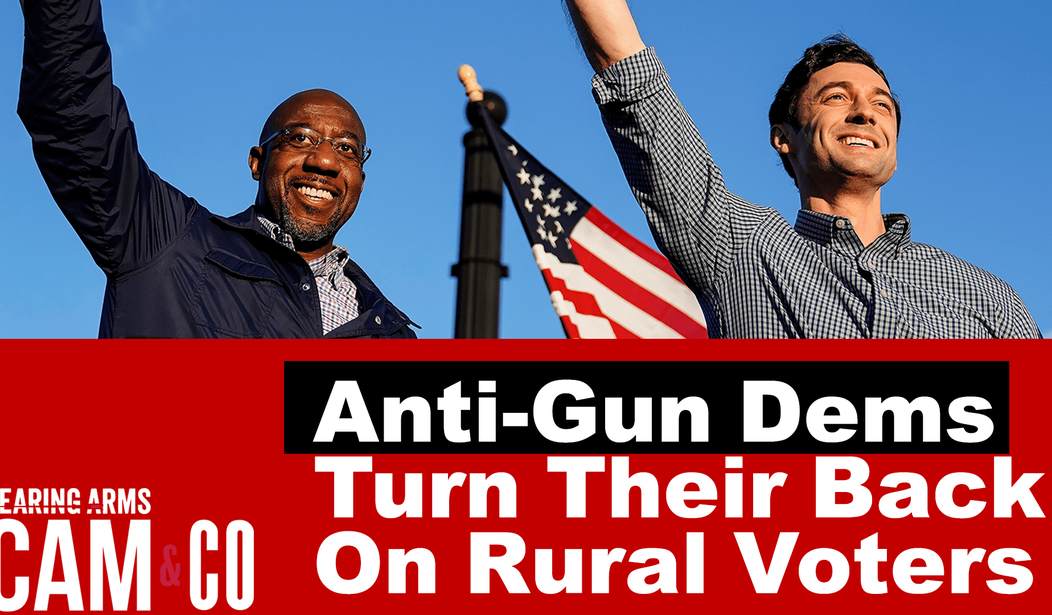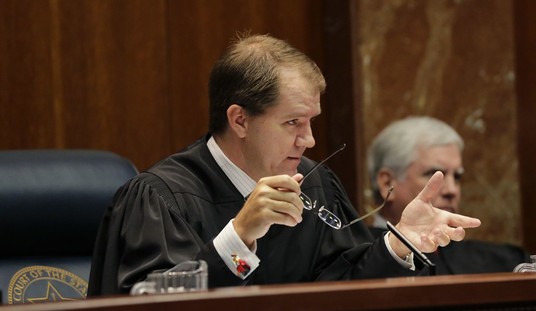It appears that Democrats are refusing to learn a very valuable lesson from the 2020 elections, which saw their hopes of a Blue Wave that would sweep the party into a dominating position in Congress come crashing down as a result of their anti-gun agenda and an onslaught of rural, exurban, and suburban voters who cast their votes in favor of the right to keep and bear arms.
Democrats lost nearly a dozen seats in the House, and their plans to take over the Senate now hinge on the state of Georgia, where early voting in the runoff elections between Republicans David Perdue and Kelly Loeffler and Democrats Jon Ossoff and Raphael Warnock is already underway (Election Day will officially take place on January 5th). While both Democrats are claiming to be “moderate” in their support for new gun laws, Ossoff and Warnock are fully on board with Joe Biden’s anti-gun agenda, including his proposal to ban and “buy back” tens of millions of legally-owned firearms.
On today’s Bearing Arms’ Cam & Co we take a look at a new report by left-of-center website The American Prospect that details the lack of effort from Democrats in recruiting rural voters in the Georgia senate campaigns and the impact that could have on the election.
Weeks away from the January 5 Election Day, ad buys from Democrats and Republicans in Georgia are mirroring the national strategy that played out during the general election, with the GOP far outspending in the rural south and north, and the Democratic machine buying out the airwaves in Atlanta and Georgia’s other big urban markets. Outside the cities, Democrats’ ground game is sparse. Warnock has fared better than Ossoff on the rural front, tapping into his grassroots network cultivated through his time as pastor at Atlanta’s Ebenezer Baptist Church (where Martin Luther King Jr. preached, and his father before him). Meanwhile, Ossoff has relied on a last-minute bus tour and that most sacred of political weapons: the yard sign.
These two tactics were highlighted by Ossoff’s campaign as the cornerstones of his rural-outreach strategy, but as one rural organizer in southern Georgia told the Prospect, “we had to drive all the way to Atlanta just to pick up the signs!” The same organizer, who spoke to the Prospect on background for fear of reprisal from the Democratic Party, said that they were one of multiple rural organizers whom Ossoff personally called over the summer to inform them that rural ad buys and outreach beyond the urban core weren’t on the table. “It’s not part of our strategy,” he said.
Honestly, why would it be? Democrats got clobbered in most of Georgia’s rural counties on Election Day, and the strategy in the runoffs is basically the same as it was in the general election; concentrate on driving up turnout in Atlanta, Macon, Savannah, and other urban areas by embracing a gun-ban agenda. Rural voters are an afterthought at best, and more often are viewed as a target of the Democrats’ ire; deplorable bumpkins who need to have their Second Amendment rights curtailed for the good of the nation.
If Jon Ossoff and Raphael Warnock were to win on January 5th, they’d be the 49th and 50th Democratic votes in the Senate, allowing the vice-president to cast any tie-breaking votes in their role as president of the Senate. The odds are that it’ll be Kamala Harris occupying that spot, and while West Virginia Sen. Joe Manchin has publicly stated that he won’t cast any votes in favor of nuking the legislative filibuster or packing the Supreme Court, it’s easy to make that pledge now. Whether or not Manchin would stand by his word if Joe Biden’s legislative agenda is at stake is another issue completely, and Georgia gun owners shouldn’t put their faith in the West Virginia senator to be the bulwark standing between the Second Amendment and Joe Biden’s gun ban.
Thankfully, while Democrats aren’t paying much attention to the state’s rural voters, Republicans and Second Amendment groups are on the ground and fully engaged. Donald Trump, Jr. has been crisscrossing the state in recent days, appearing at rallies in towns like Ringgold and Ocilla, and organizations like the NRA are spending millions in voter outreach efforts.
By the way, I’m not paying any attention to the polls in Georgia because of how inaccurate much of the polling was in the general election, but I know that these Senate races are going to be close. Early voting totals indicate extremely high turnout on both sides of the aisle, which makes polling even trickier. For those who do want to take a look at the recent polling and some other anecdotal evidence in the Georgia senate races, however, my friend and colleague Ed Morrissey at Hot Air has a round-up worth reading that I’d encourage you to check out.









Join the conversation as a VIP Member